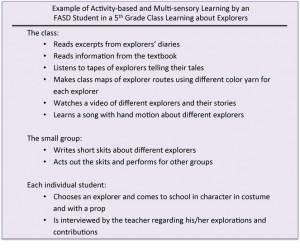Educators should view students as being unable to understand instead of unwilling to understand. FASD students are typically motivated to do well and want to please the teacher. Please review the educational strategies discussed previously in this chapter for information- processing and memory. Many of the same strategies are relevant and are presented in greater depth.
Goal Planning, Modifications, and Accommodations:
- Involve students in realistic goal planning
- Modify homework assignments as needed
- Make necessary accommodations for testing
- Make goals attainable and oriented for success
Even though these students may be quite verbal, their receptive language is compromised. They may appear to comprehend what is presented to them verbally when in actuality, they are confused.
Communication Strategies:
- Keep language simple
- Keep concepts concrete
- Use the same language to explain concepts
- Speak slowly and pause to give time for understanding
- Repeat directions and information
- Rephrase what they’ve said to you to check for understanding
- Avoid idiomatic expressions such as: “Knock it off”
- Avoid telling them what you don’ t want: “Don’t wander around the classroom.”
- Tell them what behavior you do want: “Please stay in your seat.”
- Make eye contact when speaking
- State the child’s name when speaking to them
- When possible, avoid group directions
- Pair verbal information with visual cues whenever possible
Commonly Used Idioms and Abstractions to Avoid:
- Behave yourself
- You know the consequences
- Play safe
- Think ahead
- Be responsible
- This is your warning
- Knock it off
- Settle down
- Watch your step
- Quit horsing around
- Skip question …
- Use your head
Classroom strategies discussed in Chapter 4 provide the external structure students need to focus and concentrate on new information.
- A consistent, highly structured classroom provides predictability
- Make routines habits; routines are internalized
- Consequences need to be taught through association, structure, consistency, and
repetition
Abstract Issues and Concepts Must be Made Concrete Whenever Possible (Refer to Chapter 4 – Variety)
- Relate learning to student’s life experiences
- Multi-sensory learning is essential
- Activity-based learning is most effective
- Visual teaching methods should be emphasized
- Use step-by-step instruction
